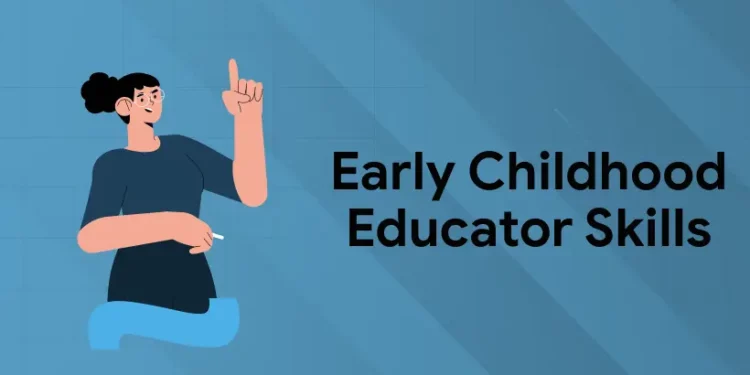Table of Contents
Early childhood educators gain a wide range of abilities throughout their careers. They need a certain skill set to be successful in this position in order to carry out their responsibilities and give their students a safe environment. Finding and developing comparable talents can be facilitated by studying the competencies of effective early childhood educators when contemplating a career in this profession. This article focusses on the skills of early childhood educators.
Master the Art of Early Childhood Care and Education ! Get free Demo Here!
Early Childhood Educator Skills
Early childhood educator skills are the specific abilities that early childhood educators employ to excel in their roles in the classroom. These abilities guarantee that teachers are aware of the developmental milestones and learning objectives of young children.
Child Development
One of the most important aspects of an early childhood educator’s skill set is their knowledge of early childhood psychology and development. They have a thorough awareness of children’s learning and development processes. This ability can assist teachers in creating lesson plans for every developmental stage of a child. In their early years, children can learn a lot and advance quickly. The duties of an early childhood educator can contribute to laying the groundwork for lifelong learning in their children.
Communication
Since young children often struggle with self-expression and effective communication, early childhood educators must possess strong communication skills. Teachers will have to interact with guardians, parents, and small children, of course. They must demonstrate effective communication skills to kids by modelling the proper technique for each individual they speak with. Children absorb knowledge mostly through relatable stories and examples. In order to effectively educate and explain new concepts to early childhood educators, they must use relatable scenarios and language that young minds may easily comprehend. It’s comparable to picking up a new language.
Organization Skills
An early childhood educator’s classroom must be structured and predictable in order to provide a safe learning environment for their kids. The teacher employs a curriculum that satisfies national, provincial, and territorial requirements. Superb organisation and administration of the classroom can aid in the learning process and help kids comprehend everyday expectations. Having good organising abilities also helps in team meetings with parents and other educators.
Creativity
Every day, ECE experts employ creativity to let kids learn through play and a variety of interactive methods. An effective teacher will be able to interest their students with a wide variety of instructional and sensory activities. Imagine coming up with an amusing game on the fly to occupy children during an unforeseen delay in the schedule, or thinking of entertaining ways to motivate a child to tidy up their blocks once they’ve finished playing. Possessing the imagination to create engaging and instructive lesson plans can help pupils grow and fall in love with learning.
Trust Building
Trust is essential for early childhood educators to have with their kids. Usually, parents want to make sure their kids respect and like their teachers. Because they don’t know the teacher well and might not be keen to connect with them right away, new pupils may find it difficult to trust the teacher. When early life educators work to build strong relationships with their pupils, supervisors assist them.
Patience
An experienced early childhood educator is extremely patient in difficult situations. This is an essential ability for teachers to have since it allows them to properly manage a disruptive student population in the classroom. Patience is paired with authority and compassion in successful education.
Awareness of Diversity
Children come from a variety of homes and backgrounds. A youngster may develop distinct learning styles as a result of this from other children. In order to ensure that their kids leave the classroom with new skills and learning objectives, early childhood educators can acknowledge these variances and work with multiple learning styles.
How to Improve Early Childhood Educator Skills
1: What is the primary focus of the first plane of development in the Montessori method?
The following steps can help you improve your abilities as an early childhood educator:
Know your Students
Being familiar with your pupils is a great teaching tool. By establishing a connection, you can better comprehend their emotions throughout the day and give them the impression that you know them well. Knowing each student’s name is an easy approach to establish a connection.
Educate in Volunteer Initiatives
Gaining as much experience as you can as a teacher is a great method to develop your abilities. In your free time, you can teach others by volunteering. Numerous volunteer teaching programs impart language, cultural, and other knowledge to international students. Teachers can teach abroad thanks to a few of these programs. Participating in volunteer work can broaden your horizons and foster compassion for your kids.
Use Humor
Using humor to help your pupils understand new material is a great strategy. Since children laugh a lot even at a young age, humour might help to keep your students happy. They will be interested in hearing more of your anecdotes if they realise you’re a humorous teacher. By using humor to get their attention, you can take advantage of the chance to impart new knowledge.
Give Engaging Examples
Making your courses engaging and fun is a great teaching strategy. You can interact with young children more effectively by providing pertinent examples. You can relate stories or occurrences you’ve heard about to your lessons or to a particular student. You can keep students’ attention during your lesson by doing this.
Entri App: Diploma Course in Early Childhood Care and Education(ECCE)
Course Description
The Diploma in Early Childhood Care and Education program prepares students for rewarding careers in early childhood education by fusing academic brilliance with real-world experience. Our course incorporates Montessori concepts and is accredited by reputable organisations, giving students a solid foundation in child development and educational approaches. With a faculty with experience and a flexible online platform, students can receive high-quality education from any location. The program’s centrepiece is a 30-day teaching practice that develops priceless abilities and insights. The credential from Entri gives future teachers the resources they need to constructively develop the minds of children.
Master the Art of Early Childhood Care and Education ! Get free Demo Here!
Get Certified & Start Your Montessori Career
Montessori Teacher Training Course by Entri App: Gain expert skills, earn certification, and kickstart your teaching career.
Join Now!Frequently Asked Questions
What is a skill in early childhood education?
Patience is unquestionably one of the most important abilities for early childhood educators. Since each child develops at their own rate, working with young children demands a great deal of tolerance and comprehension. Since there are new difficulties and opportunities in the classroom every day, flexibility is equally crucial.
What is the role of the early years educator?
Plans and supervises child-initiated and adult-led activities that are tailored to each child’s specific needs and interests.
What skills do you need to be a nursery teacher?
Excellent communication and listening skills. Strong organisational abilities to arrange the day and address the various demands of the students you instruct.
What is your motivation for working in the early years?
Witnessing the growth and success of the kids you work with is an amazing experience. Seeing the kids in their care gain self-assurance, form unique personalities, become more self-reliant, and realise their full potential brings great satisfaction to a lot of childminder educators.











